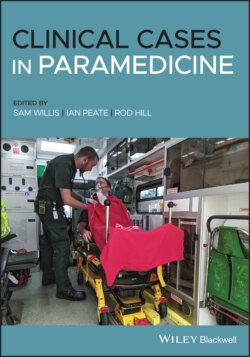Читать книгу Clinical Cases in Paramedicine - Группа авторов - Страница 133
Vital signs
ОглавлениеRR: 28 bpm
HR: 128 bpm
BP: 110/78 mmHg
SpO2: 91%
Blood glucose: not repeated
Temperature: not repeated
GCS: 15/15
4 lead ECG: sinus tachycardia
1 This type of incident may lead to high levels of stress during the time you are with the patient. Name at least four short‐term effects of stress. Increased heart rateIncreased blood pressurePupil dilationSweatingIncreased blood sugar levelsInhibitions of digestive secretionsPeripheral vasoconstrictionBronchodilationSource: ANZ (2015).
2 It is important to recognise symptoms of long‐term (chronic) stress in yourself or others. Name at least two long‐term effects of stress. Behaviour changes:Difficulty sleeping.Altered eating habits.Smoking/drinking more.Avoiding friends and family.Sexual problems.Physical responses:Tiredness.Indigestion and nausea.Headaches.Aching muscles.Palpitations.Mental responses:Increased indecision.Difficulty concentrating.Poor memory.Feeling inadequate.Low self‐esteem.Emotional responses:Mood swings, becoming irritable or angry.Increased anxiety.Feeling numb.Hypersensitivity.Feeling drained and listless.Source: Ambulance care practice (2019).
